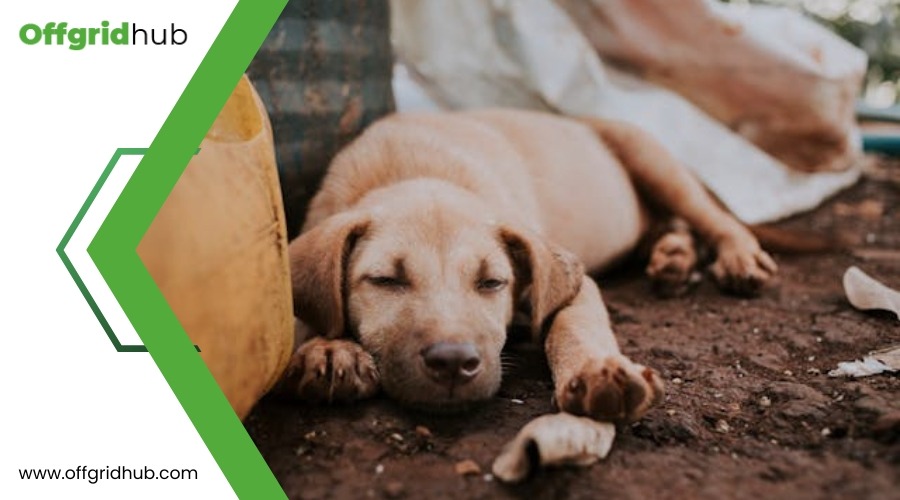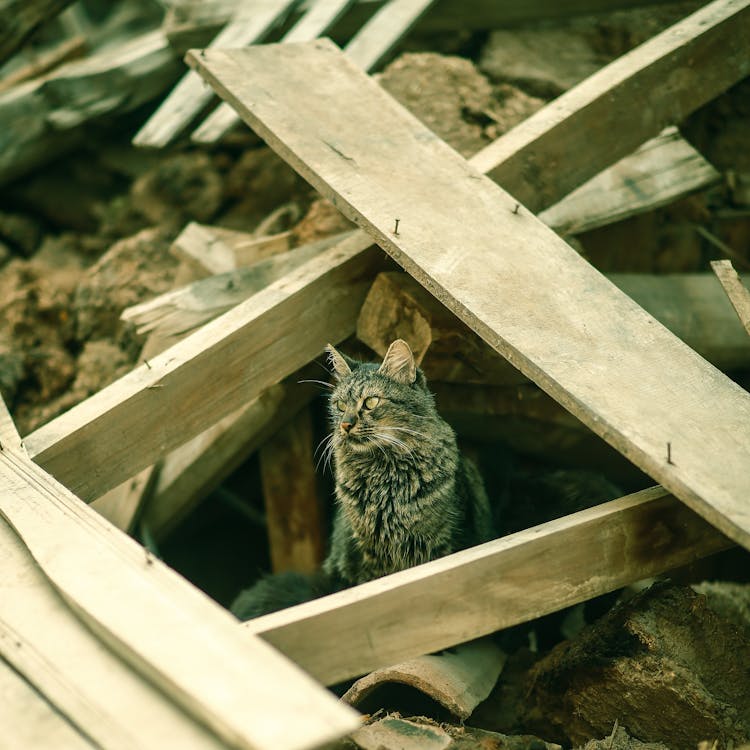Did you know that the average dog produces about 274 pounds of waste per year? That’s a significant amount, especially if you’re living off-grid and aiming for a sustainable lifestyle. You’re probably wondering how you can manage this without contributing to environmental degradation. Composting pet waste might be your first thought, but there’s more to it than just tossing it into a pile.
From the right balance of carbon-rich materials to the intricacies of hot composting, there are several methods to explore. Stick around, and let’s uncover the best practices that ensure your pet’s waste doesn’t harm the planet.
Understanding Pet Waste Impact
Recognizing the environmental impact of pet waste is essential for managing it sustainably in off-grid settings. When you think about pet waste management, you mightn’t consider the significant environmental implications. However, with a dog producing up to 325 pounds of waste per year, it’s clear why the Environmental Protection Agency (EPA) classifies pet waste alongside toxic chemicals and herbicides. This waste doesn’t just sit there; it contributes to water pollution, attracts flies, and creates unsanitary conditions that affect both human and environmental health.
Pet waste, left unchecked, releases fecal coliform into water sources, which can lead to serious health issues for people and wildlife. Moreover, as this waste decays, it feeds algae and invasive weeds, disrupting local ecosystems. You mightn’t realize it, but by managing your pet’s waste effectively, you’re playing a crucial role in protecting these ecosystems.
One method you can adopt is composting dog waste, although it’s important not to confuse this practice with general waste composting. By understanding the impact of your pet’s waste, you’re taking the first step towards minimizing your environmental footprint, even in off-grid settings.
Composting Pet Waste Correctly
How can you compost pet waste correctly to minimize its environmental impact while living off-grid? Composting pet waste is a sustainable solution that not only reduces its volume by more than 50% but also effectively destroys pathogens. When done properly, the compost emits a pungent mossy scent, far from the offensive odors one might expect. Moreover, using this compost as a soil amendment can significantly enhance soil structure and provide plants with essential nutrients. However, achieving these benefits requires adhering to specific practices, especially in an off-grid setting.
Here are key steps to ensure effective composting of pet waste:
- Hot composting: Ensure the compost heats up for at least 60 days to kill pathogens before adding to worm bins.
- Balance materials: Maintain the right ratio of pet waste to carbon materials to facilitate proper composting.
- Regular monitoring: Check the compost regularly for the correct temperature and moisture levels.
- Safe usage: Only use the finished compost on non-edible plants to avoid any health risks.
- Odor control: Correct composting practices should result in a mossy scent, indicating a healthy composting process.
Biodegradable Bag Solutions
While composting pet waste correctly is essential for a sustainable off-grid lifestyle, choosing the right type of disposal bags plays a crucial role in minimizing environmental impact. Biodegradable dog poop bags, made from plant-based materials like cornstarch or recycled paper, offer a sustainable solution for pet waste disposal in off-grid settings. Unlike traditional plastic bags, these biodegradable options break down naturally in the environment, significantly reducing plastic pollution.
To ensure you’re genuinely making an eco-friendly choice, look for certifications like ASTM D6400 or USDA BioPreferred on the packaging. These certifications guarantee that the bags meet strict standards for biodegradability and are made from renewable materials. By opting for bags with these certifications, you’re not just disposing of pet waste sustainably; you’re also supporting eco-friendly practices that contribute to a healthier planet.
DIY Pet Waste Digesters
For those living off-grid, DIY pet waste digesters, such as the Doggie Doolie, provide a practical and eco-friendly method of managing your pet’s waste. These innovative systems offer an in-ground composting solution that naturally breaks down dog waste, converting it into compost suitable for non-edible plants. However, implementing a DIY pet waste digester requires consideration of several factors to ensure its effective operation and sustainability.
Here are key points to remember when setting up your digester:
- *Ensure the right temperature conditions* are met for efficient decomposition.
- *Craft your own system* if you’re handy, tailoring it to your specific needs and space.
- *Be mindful of maintenance requirements* to keep the system functioning properly.
- *Consider the space available* in your off-grid setting for the digester.
- *Understand usage limitations,* especially concerning the type of pet waste it can handle.
Vermicomposting Essentials
Vermicomposting often turns pet waste into a valuable resource by utilizing worms to break down the material into nutrient-rich compost. This method is not only sustainable but also significantly reduces waste volume while producing an excellent soil amendment. By introducing worms into your composting system, you’re ensuring that your pet waste doesn’t just disappear; it transforms into something that can enhance soil fertility and promote healthier plant growth.
Maintaining proper moisture levels and ensuring adequate aeration are crucial steps in the vermicomposting process. These conditions allow worms to thrive and speed up the decomposition of pet waste. Here’s a quick guide to get you started:
| Factor | Importance | Tips |
|---|---|---|
| Worms | Decomposers | Use red wigglers for best results. |
| Moisture | Essential for worm life | Keep the compost damp, not soggy. |
| Aeration | Prevents odor | Turn the pile regularly to add air. |
| Pet Waste | Compost material | Avoid adding meat or dairy products. |
| Soil Fertility | End goal | Use finished compost to enrich soil. |
Natural Disposal Alternatives
Exploring natural disposal alternatives allows you to manage pet waste sustainably, even in off-grid settings. One such effective method involves the use of a bottomless 5-gallon plastic bucket, buried in the ground. This approach isn’t only discreet but also leverages natural decomposition processes to minimize environmental impact.
Here’s how you can implement this natural disposal strategy:
- Bury a green plastic bucket: Choose a green 5-gallon plastic bucket for its inconspicuous nature, making it blend seamlessly into your off-grid surroundings.
- Make it bottomless: Removing the bottom of the bucket allows for direct contact with the soil, facilitating natural decomposition.
- Add water and septic starter: Cover the pet waste with water and a septic starter to enhance the breakdown process, ensuring it decomposes slowly without releasing odors, even in warm climates.
- Ideal for small pet households: This method is most suitable for homesteaders with a limited number of pets, looking for a sustainable waste management solution.
- Minimizes environmental impact: By utilizing natural processes underground, this technique helps in reducing the environmental footprint of pet waste in off-grid locations.
Adopting this natural disposal method not only keeps your off-grid homestead clean but also contributes to a sustainable lifestyle.
Managing Odors Naturally
When managing pet waste in an off-grid setting, naturally controlling odors is essential, and incorporating substances like baking soda and vinegar can be highly effective. These natural odor control methods not only mask unpleasant smells but also contribute to a healthier composting process. By adding baking soda or vinegar to your pet waste compost, you’re taking a step towards transforming waste into organic fertilizer without the unwanted stench.
Activated charcoal is another ally in your fight against odors. Its porous nature allows it to absorb smells effectively, making it a great addition to your pet waste management strategy. You can place a layer of activated charcoal at the bottom of your compost bin to capture odors before they escape.
Sprinkling lime or diatomaceous earth over the waste can neutralize odors further, while adding pine pellets or wood shavings will introduce pleasant scents and aid in reducing smells. Remember, proper ventilation and regular turning of your compost piles are crucial odor control methods. These steps ensure that air circulates adequately, speeding up the composting process and preventing the accumulation of foul odors. By employing these natural solutions, you’re on your way to effectively managing pet waste odors in an off-grid setting.
Pet Waste Collection Services
For off-grid pet owners, pet waste collection services provide a hassle-free way to manage disposal and help protect the environment. These services are a boon, especially for those who might find it challenging to dispose of dog poop in an eco-friendly manner due to their remote living situations or physical constraints.
By choosing a pet waste collection service, you’re taking a significant step towards reducing environmental contamination.
Here are a few key points to consider:
- Convenience: These services offer a straightforward solution for managing pet waste without the hassle.
- Environmental Protection: They ensure pet waste is disposed of properly, preventing contamination.
- Accessibility: Ideal for individuals in remote areas or with limited mobility.
- Sustainability: Dog waste companies transport the waste to suitable disposal sites, minimizing the environmental footprint.
- Research: It’s crucial to look online for local services that align with off-grid living requirements.
Flushing Pet Waste Safely
You can significantly reduce your environmental footprint by opting to flush your pet’s waste, provided you follow the right guidelines. Flushing pet waste down the toilet is a sustainable method that’s safe for the environment, as municipal water treatment facilities are equipped to process water containing fecal matter from flushed pet waste. This approach helps in cutting down the environmental impact associated with traditional waste disposal methods.
However, it’s crucial to note that flushing dog poop isn’t suitable for septic tanks. These systems aren’t designed to handle pet waste, which can lead to complications. By ensuring you’re connected to a municipal sewage system, you’re making an environmentally friendly choice for disposing of your pet’s waste.
Choosing to flush your pet’s waste helps in minimizing the use of plastic bags and reduces landfill contributions. Remember, water treatment facilities can effectively handle the waste, making flushing a viable option. By adopting this method, you’re contributing to a more sustainable approach to pet waste disposal, aligning your off-grid living with eco-friendly practices.
Educating on Eco-Friendly Practices
Educating pet owners on sustainable waste management practices is a crucial step towards reducing environmental impact. When you’re living off-grid, it’s especially important to incorporate eco-friendly habits into every aspect of your life, including how you handle pet waste. Implementing sustainable practices not only protects the environment but also ensures that you’re preserving the health of local water sources and promoting Environmental Health.
Here are some key strategies to consider:
- Choose biodegradable bags: Opt for pet waste bags made from plant-based materials to minimize plastic pollution.
- Compost pet waste: Set up a compost pile specifically for pet waste to reduce landfill use. Ensure it’s away from food gardens and water sources.
- Utilize in-ground composting: In-ground composting systems for pet waste help minimize its environmental footprint.
- Flush pet waste: Where possible, flush pet waste down the toilet to conserve landfill space and protect water resources.
- Support local eco-initiatives: Engage with community programs that offer sustainable pet waste solutions.
Conclusion
In conclusion, managing pet waste sustainably off-grid is essential for protecting our environment. By composting correctly, using biodegradable bags, creating DIY digesters, and understanding vermicomposting, you’re on the right track. Remember, controlling odors naturally and considering pet waste collection services or safe flushing methods can further your efforts.
Most importantly, educating yourself and others on eco-friendly practices ensures a healthier planet. So, let’s commit to responsible pet waste management and make a positive impact together.



